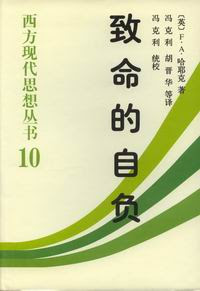The title of an article I found, 哈耶克的“自发社会秩序”理论与中国经济改革的思路选择 [Hayek's "Spontaneous Order" Theory and China's Economic Reform Ideas and Choices] by Sen Wei (韦森), looked promising. However, most of the article focused on the philosophical background, i.e. the Scottish moral philosophers, of Hayek’s work. The only concrete sentence about Hayek and the Chinese economy was:The achievement and glistening historical path of the Chinese economic reforms, especially the huge success of early-stage rural reforms, to an extent can be considered a confirmation and development of that which clearly came out of the logical background of Hayek’s spontaneous order.
The author received his Ph.D. from the University of Sydney, and is now a professor of economics at Fudan University. In 2009, he gave a speech at the Academic Seminar on Professor Zhenglai Deng’s (邓正来) New Book on Hayek’s Theories of Liberalism.
Nobody should think that Hayek’s influence in the West is very big. Currently, there are more people in China that know about Hayek than there are in the West. Also, a lot of students of Western academic circles say Hayek is hard to understand. I’ll give you an example: Hayek’s last book, The Fatal Conceit, was published in 1988. I went back to the University of Sydney in 2001 and borrowed the book. When I was reading it, I discovered the book had been there for two years, and only two people had borrowed the book. One of those people was myself. One time, the former president of the University of Chicago College of Law, Saul Levmore, visited Shanghai. He asked me what I was researching, I said “I’m studying Hayek.”
He said “Oh, studying Hayek! It’s very hard to understand him.”
It’s harder to discuss Hayek’s thoughts with foreign economic circles. Even Hayek, himself, recognized this. During his later years, at the Bartley lectures, he said, referring to economic studies, “I’m an outsider.”
It doesn’t matter if the majority of foreign academics accept and understand Hayek, or not, because without a doubt, Hayek is one of the 20th Century’s greatest thinkers. This point we certainly need to remember.

I borrowed The Fatal Conceit and Collectivist Economic Planning from the Armacost Library. The Fatal Conceit has been checked out four times in the last five years (including myself), and the last time Collectivist Economic Planning was checked out was in 1998.
John Stossel blogged on Thursday that he will confront the New York Times over it’s referencing of Hayek's writings as “long-dormant ideas,” in a class of “once-obscure texts by dead writers.”
He quotes David Boaz’ piece on Cato@Liberty,So that's, you know, "long-dormant ideas" like those of F. A. Hayek, the winner of the Nobel Prize in Economics, who met with President Reagan at the White House, whose book The Constitution of Liberty was declared by Margaret Thatcher "This is what we believe," who was described by Milton Friedman as "the most important social thinker of the 20th century" and by White House economic adviser Lawrence H. Summers as the author of "the single most important thing to learn from an economics course today," who is the hero of The Commanding Heights, the book and PBS series by Daniel Yergin and Joseph Stanislaw, and whose book The Road to Serfdom has never gone out of print and has sold 100,000 copies this year.
He didn’t mention his influence on China. I guess that’s why this is a good topic for my Latin Honors.
No comments:
Post a Comment